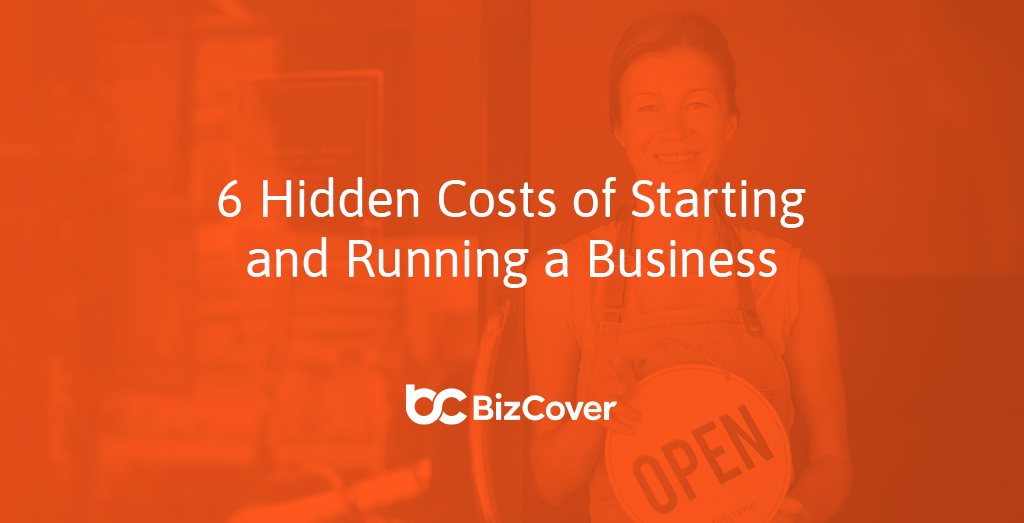Hidden costs you shouldn’t ignore when starting your business
No matter what others tell you, starting out as a small business owner may not be cheap or simple. There can be many hidden business costs associated with starting and running a small business, and these rising costs have a tendency to easily sneak up on new business owners. If you’re not careful, they can make a meal of your bottom-line.

It’s one thing to get a business started and have a successful grand opening. It’s another thing to turn your start-up into a fully operational business that has a long-term business plan and a business strategy. Without these, you may be in danger of compromising the future of your new business sooner than you think if you don’t prepare for hidden costs.
The hidden costs of when starting out in business
1. Your time
Most entrepreneurs start their business to achieve a better work-life balance but the irony is they often don’t. Rather, they can sink into doing everything.
As a business owner, know what every hour of your time is worth and use that to figure out what you should (and shouldn’t) be spending your time doing.
2. Hiring staff
There’s only so much that one person can do. Sooner or later you will likely build a team around you. Hiring staff is a cost you will have to cover in the form of salaries, superannuation, and employee benefits such as annual leave. Consider how you will grow your business by taking on employees, whether on a permanent, casual, or contract basis.
3. Employee benefits
Attracting quality employees to your team – and keeping them – means able to offering benefits in addition to a competitive salary. For example, you may offer an employee benefit of additional annual leave days as an incentive for jobs done well.
4. Business software subscription costs
The introduction of Single Touch Payroll in Australia means that if you intend to employ staff, you will need to use this software to report salaries and superannuation with each pay run. Expect to pay ongoing subscription costs for business software such as payroll software and CRM programs.
Getting your new business operational will require investment in a suite of business software, such as:
- customer relationship management software;
- accounting software;
- project management software; and
- marketing automation software.
These software packages typically require an upfront purchasing fee and an ongoing subscription cost. And while on the subject of subscriptions and memberships, you may also be required to join industry-specific bodies for a fee.
5. Business insurance costs
When starting a business for the first time, you may not appreciate (or know much about) the critical role that business insurance can play in reducing your exposure to business risks. However, when you become a small business owner, investing in business insurance is often one of the most important first steps.
Whether you are purchasing business insurance for the first time or for the 10th time, BizCover makes comparing competitive business insurance quotes online fast, and easy.
We can also help you to reduce your business insurance costs by presenting you with competitive business insurance quotes from multiple leading Australian business insurers. And thirdly, we don’t expect you to wait around all day standing in a queue; when you purchase your business insurance online via the BizCover website, in most cases your small business will be covered in 10 minutes.
How are business insurance premiums calculated?
Generally speaking, the cost of business insurance is based on several factors, such as:
- the type of business;
- the size of the business;
- the industry;
- where the business is based;
- its revenue;
- present risk factors; and
- the number of employees.
For small business owners who are already operating on a tight budget, servicing these business costs may be difficult to manage. However, for most businesses there is a clear business case for squeezing for allocating budget for business insurance.
Professional Indemnity
If you have members of the public visiting your business’ premises, regardless of whether they’re customers or not, their safety is your responsibility once they step foot inside. In the same way, if you’ve sent employees to visit a customer’s premises, such as an electrician, your business also has a responsibility to the premises you or your employees are visiting.
Professional Indemnity (PI) can cover your legal liability to pay compensation for injury or damage to property caused to a third party in connection to your business. While PI is not required for all businesses, certain occupations require a minimum amount of coverage. This requirement can be set by federal or state legislation, an industry group, or a professional regulator.
Then following occupations are required to hold PI:
- accountants;
- architects and draftsmen;
- bookkeepers, BAS and Tax Agents;
- electricians in QLD;
- finance and mortgage brokers;
- plumbers in VIC;
- real estate agents in NSW; and
- registered migration agents.
Public Liability
If you have members of the public visiting your business’ premises, regardless of whether they’re customers or not, their safety is your responsibility once they step foot inside. In the same way, if you’ve sent employees to visit a customer’s premises, such as an electrician, your business also has a responsibility to the premises you or your employees are visiting.
Public Liability (PL) can cover your legal liability to pay compensation for injury or damage to property caused to a third party in relation to your business. If your business is involved activities with the general public or other businesses, PL can cover you for:
- compensation costs for personal injuries suffered by a third party, such as a customer, supplier or member of the public;
- compensation for damage to property owned by a third party due to your negligent business activities;
- legal and defence costs associated with a covered claim; and
- compensation for damage of third-party goods not owned by you which are in your care, custody or control.
As such, PL is considered critical for many small businesses, especially if your business involves activities with the public and other businesses. When shopping around for PL cover, it’s worth clearly understanding what your policy covers your business for, and what it doesn’t.
If your business is on the receiving end of a PL claim could you cover the related legal expenses as well as any compensation you may be required to pay? The last thing small business owners want to do is put their personal finances in jeopardy to pay for the incurred debt as a result of a claim.
Cyber Liability
In this day and age cybercrime is one of the biggest threats facing many business owners. Lurking in the shadows, cybercriminals infiltrate businesses from afar, and their criminal work is often difficult to detect. Cybercrimes can go undetected for long periods.
However, Cyber Liability (CL) can be a cost-effective way to reduce your exposure to cyber risk. If cyber criminals target your business you will avoid the worst of the consequences. CL covers the following:
- data breaches including theft or loss of client information;
- network security breaches;
- business interruption costs;
- forensic investigation into the cause or scope of a breach;
- data recovery costs;
- cyber extortion;
- crisis management costs; and
- loss and legal costs, including fines and penalties resulting from a third party claim.
Business Insurance
Business Insurance – referred to as a “business insurance pack”, or simply “BizPak” – can provide cover for your business premises and contents against loss, damage, or theft, as well as cover against financial loss from an insured interruption to your business.
While PL, PI, and Business Insurance are the main types of business insurance typically included in a BizPak, the specific types of business insurance and the level of cover you select will depend on the nature of your business and the areas where you feel your business is most at risk.
You can pick and choose the business insurance policies that you think suit your needs, and you may include PL in your BizPack to ensure you are not financially responsible for the rising costs of a legal claim should a third party get injured or suffer property damage whilst you are doing business.
Management Liability
Management Liability helps protects company directors, officers, and the insured company from exposures relating to the management of a business. You can match your ML coverage to your specific business risks. Types of ML cover include:
- Corporate Liability;
- Employment Practices Liability;
- Crime;
- Statutory Liability; and
- Directors & Officers Liability.
Business Insurance
While PL covers your business from the risk of being sued by a member of the public, and PI can come to the rescue if a client makes a claim against you for negligence, may help to protect your venture.
You might also consider insuring your business equipment, or your own inability to work due to illness or injury. There may also be some insurance cover which may be mandatory for your set-up, such as employer’s liability if you have employees.
Depending on your businesses’ exposure to risk and the level of cover you choose, business insurance may be cost-effective or it may not. Either way, business insurance is not something to be ignored – if you intend on making your new business a long-term concern. Whether you run a business from home, or from a commercial premises, business insurance can help reduce your exposure to business risks
Other business costs you may also need to cover
Tools and equipment
From the literal tools that tradies rely on, to IT hardware and software to business systems. These tools and technologies enable you to do what you do best.
Financial planning and succession planning
Small business financial planning is an ongoing process where business owners create short-term and long-term business goals and tactics to achieve them. Businesses fail from time to time, but scenario planning can help to better understand the financial barriers that can arise at every stage of growth, and the options available in terms of funding sources.
Licences and permits
Many small business owners are required hold certain licences and permits, which generally come with an application fee.
Legal fees
Many business owners engage a legal representative to help navigate critical business issues such as compliance, succession planning, and copyright infringement.
Make business insurance easy today
At BizCover we make comparing competitive business insurance quotes easy, fast, and 100 per cent online. Get covered in minutes, avoid business insurance drama, and enjoy a better business insurance experience today. Give us a call on 1300 249 268 if you prefer to talk.
This information is general only and does not take into account your objectives, financial situation or needs. It should not be relied upon as advice. As with any insurance, cover will be subject to the terms, conditions and exclusions contained in the policy wording. © 2025 BizCover Limited.





